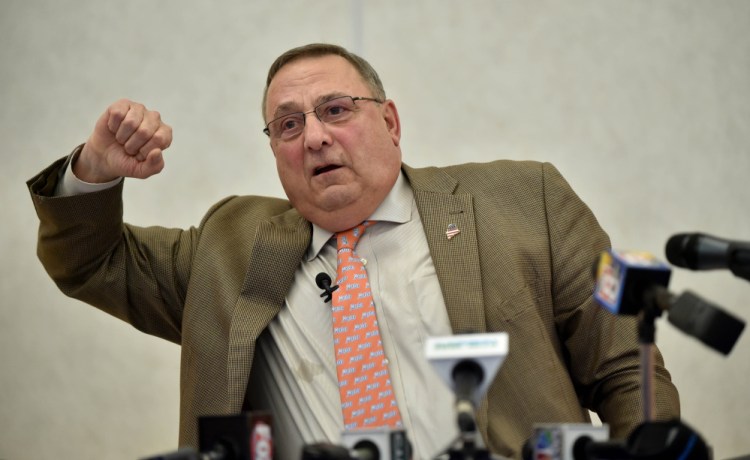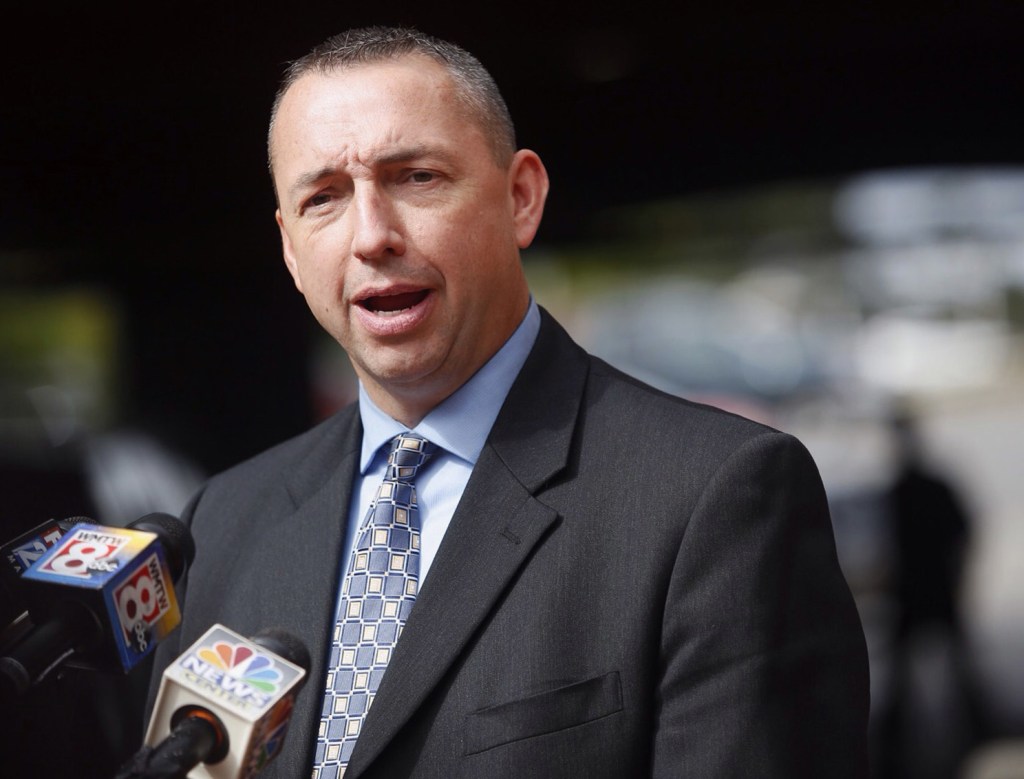Portland Police Chief Michael Sauschuck said Monday that Gov. Paul LePage was mistaken about an anecdote he shared this month when he said a Deering High School student had overdosed and was revived three times before returning to class.
Sauschuck said the story the governor was told by Deering’s school resource officer, Steve Black, was about an overdose in Deering Oaks park and did not involve a student.
“I talked to Officer Black. The story was never about students. It was never about schools,” the chief said Monday night.
Sauschuck’s explanation came hours after LePage, appearing on the Maine Public Broadcasting Network, doubled down on his claim and then went further by suggesting that perhaps schools were not reporting overdoses.
“I’m thinking of calling (U.S.) Attorney General (Loretta) Lynch and asking for her investigative arm to come up and look at the school systems in Maine,” LePage said. “I think it’s serious enough. I believe it happened.”
The “it” in question is an anecdote that LePage shared May 4 during a town hall meeting in Lewiston while explaining his opposition to expanding access to the drug Narcan, also called naloxone, which reverses the effects of an opiate overdose.
“A junior at Deering High School had three Narcan shots in one week. And the third one, he got up and went to class. He didn’t go to the hospital. He didn’t get checked out. He was so used to it he just came out of it and went to class,” LePage said.
NO APOLOGY AFTER PRIVATE LETTER
Portland’s acting superintendent, Jeanne Crocker, and Deering High School Principal Ira Waltz immediately came out strongly against the claim.
“Unequivocally no. This did not happen at Deering High School,” Crocker said.
Waltz said the school doesn’t even have Narcan on campus.
On Monday, Democratic lawmakers from Portland ratcheted up pressure on LePage to apologize.
“Deering doesn’t deserve to have its reputation maligned by the highest elected leader in our state,” said Senate Democratic leader Justin Alfond of Portland. “The governor owes it to our community to set the record straight. Donald Trump may double down on his lies when confronted with the truth, but we can’t sit by while Gov. LePage makes up hurtful stories about our community.”
Portland-area lawmakers had sent a letter to LePage on May 11 asking him to apologize privately. They said he has remained silent, which prompted them to go public.
“It’s another example of ‘Ready, Fire, Aim.’ I can’t imagine how the governor came up with this story about our students and our high school,” said Rep. Erik Jorgensen, D-Portland, whose district includes Deering High. “This didn’t happen, plain and simple. He should check his facts. But more than that, he owes the hardworking students and faculty of Deering an apology.”
But LePage appeared to dig in even more during his radio remarks Monday.
“It was not fabricated,” he said. “This is an actual conversation I had.”
Adrienne Bennett, the governor’s spokeswoman, declined to comment Monday or elaborate on what the governor said on the radio. She said LePage was told the anecdote by a school resource officer and that the police chief was in the room. She declined to identify either officer, although Portland has only one police chief, Sauschuck.
The chief said the governor and Officer Black spoke during an event last fall at the police department. Sauschuck said he wasn’t there for the entire conversation, but Black told him about the exchange.
“They were talking about heroin and (Black) shared the story of a very public overdose in Deering Oaks park,” Sauschuck said. He said LePage may have been confused because Black is a school resource officer during the school year, but was in the patrol unit when the park overdose happened during the summer.
STATE: YOUTH NARCAN USE IS STORY
A Deering High student, Hanna Amergian, predicted the Deering Oaks connection in a letter to the editor last week.
“The cold hard truth is that LePage apparently needed reasons for why he vetoed the bill (for naloxone to be sold without a prescription), and he did not have a solid reason. Therefore, he constructed some elaborate story about a Deering High School student who does not exist,” she wrote. “What I believe happened is that he was either confused or changed what happened last year in Deering Oaks, where someone had overdosed. What I do not understand is why he would change what actually happened.”
Rather than provide additional details about exactly where LePage heard the false anecdote, Bennett provided data compiled by the state’s emergency medical services agency on use of naloxone. It showed that nine people under the age of 18 were administered the drug statewide in 2015, but it did not say where those cases were or whether they were in schools. Another 107 people aged 18-24 were given the drug, Bennett pointed out, suggesting some “may be high school students.”
“It is very concerning to our governor that our youth are being administered Narcan shots,” she wrote in an email. “This is the story.”
Asked in a follow-up email why the governor didn’t share that data rather than the Deering High anecdote, Bennett did not respond.
HISTORY OF INACCURATE CLAIMS
During his time as governor, LePage often has used anecdotes to make his points, but he has been proven wrong on several occasions.
In 2012, he was speaking about the problems in Maine’s public schools and how that affected college applications when he said this: “If you go to William & Mary, apply to William & Mary, before they’ll look at your application, if you’re from a Maine school, you have to take a placement exam to see if you qualify.”
A spokeswoman for the college quickly corrected the governor, whose staff later said that LePage was working off information he received in 2005 from an unidentified employee at the school.
In April 2013, the governor used an anecdote to bolster his opposition to wind power. He claimed that a wind turbine on the campus of the University of Maine at Presque Isle was run by a “little electric motor that turns the blades.”
A university spokesperson laughed when asked about the claim and then said it was not true.
Last year, LePage insinuated that Maine author Stephen King spent more time in Florida to avoid paying full property taxes on his Bangor home.
King took to Twitter to fire back.
“Governor Paul LePage implied that I don’t pay my taxes. I do. Every cent. I think he needs to man up and apologize,” King wrote.
The governor did not.
Copy the Story Link
Send questions/comments to the editors.





Success. Please wait for the page to reload. If the page does not reload within 5 seconds, please refresh the page.
Enter your email and password to access comments.
Hi, to comment on stories you must . This profile is in addition to your subscription and website login.
Already have a commenting profile? .
Invalid username/password.
Please check your email to confirm and complete your registration.
Only subscribers are eligible to post comments. Please subscribe or login first for digital access. Here’s why.
Use the form below to reset your password. When you've submitted your account email, we will send an email with a reset code.